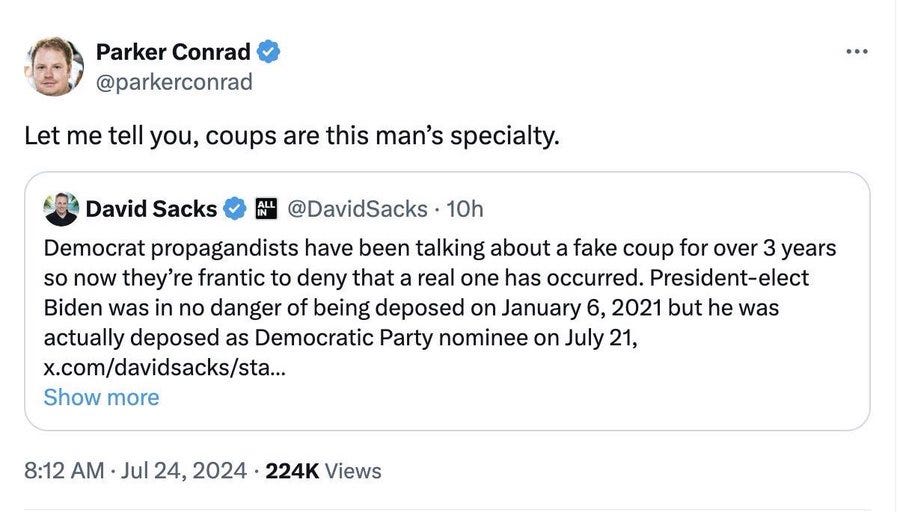Deel-Rippling is The Worst Spy Story Ever
The lower the stakes, the harder people fight
In the legendary TV series The Wire, a prominent character in the early seasons of the show is Wee-Bey Brice, a key member of Avon Barksdale’s Baltimore gang. Wee-Bey is indicted for murder but is offered clemency in exchange for testimony that would help the police bring down key members of Avon’s organization.
When deciding between an extended jail sentence or ratting out his friends/colleagues, he decided honor and and street code were more important.
"Ain't no thing. I'll do them years." — Wee-Bey Brice, The Wire
Over the course of the series, a few accused gang members make the same decision. Last week, somebody from a different type of organization must have been inspired by Wee-Bey. This time, it was an employee of the HR software company Rippling, that decided to risk potential jail time to help their previous employer, Deel. The employee referred to as D.S, had been working at Rippling since June 2023 in their Ireland office. Rippling noticed he regularly tried to search internal company records, for information on Deel, that was unrelated to his role.
To confirm their suspicions, Rippling decided to set up a “honeypot”, something appealing that would draw D.S in, if he was trying to access sensitive information. Well what do you know folks, D.S went for it, and they caught him with his head stuck in the jar. Instead of owning up to it, what does he do? Run and lock himself in a bathroom at the Rippling offices and refuse to come out. To make matters stranger, he flushed his phone down the toilet. Rippling then tried to get to it by emptying the drain pipes. Rippling filed a law suit, with CEO Parker Conrad taking to X to explain in great detail what happened. Deel denied any wrong doing.
This is fairly scandalous for the HRIS space, a vertical that isn’t exactly known for dripping with excitement (sorry HR folks). Rippling and Deel aren’t building rockets, HR professionals just need something that ensure theirs employees get paid on time. So why would D.S, or anyone be willing to risk jail time for something like this? This is something we will explore this week.
But first, make sure to hit the Subscribe button below to join the nearly 1,000 Subscribers that get articles like these, delivered directly to their inbox.
If this week’s article does not interest you, please check out some other recent ones:
Background: Rippling, Deel & The HRIS Landscape
If you’ve never heard of Rippling, Deel, or HR software in general, here’s a quick primer. If you’ve worked in a company with more than 10-15 employees, you’ve likely encountered the Human Resources (HR) department. In smaller companies, it might be just one kind but overworked person named Peggy or Susan, whereas in larger organizations, it’s an entire army of Brenda’s, Trichelles, Elisabeths, Ashleys (with an E or an I), Marys, and always one token dude named Greg or Mark. Regardless of the company size, your experience at work is inevitably shaped by someone in HR.
HR departments have a many responsibilities but these can be roughly be broken into 3 main categories:
Talent Management (Recruitment, Performance Evaluations, Termination)
Compensation & Benefits (Payroll, Insurance, Stock Options etc.)
Compliance & Culture (Company Policies, Regulatory Reporting, Complaints etc.)
No matter the size of a company, these responsibilities have to be addressed. That’s why the HR software market is massive; every organization is a potential customer, and there are an estimated 350 million companies worldwide. Naturally there are many software solutions looking to help the HR team with these, like any software vertical, you have some vendors only addressing specific items (point solutions) while others try to address all of them (full suite).
For smaller companies, you have many point solutions for each specific category and sub-category. This makes sense, since 90% of companies have less than 250 employees, putting them in the small to medium sized (SME) segment. As you go up market, there are fewer vendors capable of addressing all of the specific requirements of enterprise customers (>1,000 employees), therefore vendors are generally full suite.
In the context of the HRIS space, Workday, UKG and SAP SuccessFactors are squarely full suite Enterprise tools, that can also manage larger mid-market companies. On the other end of the spectrum, you have SME focused point solutions such as Greenhouse (Recruitment), CultureAmp (Talent Management & Culture).
Rippling launched with a mission to provide full-suite HR and finance tools tailored to SMEs, covering everything from payroll to compliance. Meanwhile, Deel started as a point solution for companies hiring internationally, helping businesses manage compliance and payroll for remote workers. Over time, both have expanded their offerings, leading to direct competition—especially as they fight for fast-growing SME accounts.
With this context in mind, let’s get back to the espionage saga.
Value of Stolen Information:
In business, everyone makes a big deal about trade secrets, customer lists, and confidential strategies as if they’re the keys to world domination. Let’s be real. In software knowing your competitor’s strategy doesn’t matter. Execution does.
Short of getting a competitors entire codebase, intelligence from another player doesn’t change the trajectory of your business because selling software is complicated. However over the long run, the player with the stronger product, sales team, and customer success operation will come out ahead. Having inside knowledge on a rival doesn’t change that. If you need to resort to copying or competitor watching, you probably lack conviction with what you’re doing. Yet still, companies invest millions of dollars into product marketing and competitive analysis. Even without this or employing spies, information leaks all the time. Whether it’s from prospects, investors, former employees, or internal gossip, it’s not difficult to find out what other companies are doing if you’re motivated enough.
Most of this information is inconsequential anyway. Millions of NDAs (Non-Disclosure Agreements) are signed every year, yet most violations go unnoticed or unenforced because proving a company benefited from a minor leak is nearly impossible, and most of this information isn’t even worth the hassle of investigating. This is why it would be silly to try to implant a double agent with a competitor. Deel could likely get a lot of this information without going to such lengths, but even with a real-time feed of Rippling’s potential churn risks or target accounts, the advantage gained would be minimal. If Deel’s customers are unhappy, no stolen data can magically prevent them from leaving. If Deel’s customer success team can’t identify churn risks before Rippling does, it speaks to a larger problem with the company.
Let’s be real, Rippling and Deel are selling software that is a slight upgrade over well designed spreadsheets. They aren’t developing deep tech, AI models, or highly proprietary innovations where a single leak could shave years off a competitor’s R&D. There’s no grand secret sauce. At best, seeing a competitor’s strategy might lead to some minor adjustments or conversations that sound something “Interesting, they see the market differently than we do. Maybe we should rethink our roadmap.” But if a company is completely pivoting just because of a leaked competitor strategy, they probably had weak conviction to begin with, which, frankly, means they don’t have much confidence in their team. They were going to lose anyway.
This is why corporate espionage is overrated. If you don’t know what your customers want, no amount of spying, copying, or sabotage is going to save you.
Parker Conrad is Not Afraid to Beef:
It should be noted, there is a very good chance that this story is being overblown for clicks. What probably happened is D.S is still friends with people at Deel and they would occasionally ask them for help or info. This happens at every company to varying degrees, some people are more or less discreet about it. Rippling clearly noticed D.S was doing this (a lot), chose to investigate and saw an opportunity to leverage this for a lawsuit against a competitor. They must have felt they had enough evidence to bring in a legal heavy hitter like Alex Spiro to make a real case out of it.
Parker Conrad is not one known for shying away from conflict with rivals; he’s had many public debacles or feud with competitors, investors, or former colleagues. He was ousted as CEO of Zenefits, the company he founded, after being accused of violating state employment regulations and fostering an unprofessional work culture (a condom was allegedly found in the stairwell of the office).
This episode was brought back up when, Conrad shared his perspective on Logan Bartletts podcast and a few others in recent years. Conrad blamed David Sacks for his ousting, along with many of the infractions that led to the scandal. This was followed up with a heated twitter exchange with David Sacks, and other prominent Valley figures. Needless to say, Conrad and Sacks have a very different perspective on what went down.
From a strategic standpoint, Conrad had nothing to lose by sharing his version of went down with Zenefits; those that think he’s in the wrong already have a negative view of him, but potentially he can win over others that don’t have their mind set. In the same way, Rippling can only win by publicizing this lawsuit. The mere accusation hurts Deel’s credibility and could scare away potential customers. Even if they don’t win, Rippling might peel off a few new accounts. If nothing comes of it, they probably won’t lose customers; the greater risk is wasted dollars and the distraction.
Rippling itself recently came under fire for violating sanctions related to Russia and likely welcomed the opportunity to distract the public from that news (Deel faced similar accusations). At the end of the day, Rippling has raised over a billion dollars, to stand out in a brutally competitive HR tech market. They can risk the money in a fight with Deel, if it helps them make inroads against them. The two companies are similar in size, it’s easier for Rippling to go after them this way instead of giants like Workday, SAP, or UKG.
In short, this lawsuit might be as much about PR as it is about actual wrongdoing.
Conclusion: Sensational but Pretty Stupid
Did Deel’s leadership orchestrate an elaborate spy operation to take down Rippling? Highly unlikely. Did Rippling see an opportunity to turn an internal scandal into a PR stunt? Much more plausible. Unless you believe the top brass of Deel got together and decided the best use of their time was to infiltrate Rippling, one of many competitors. Perhaps they are just big fans of Nathan For You?
Realistically, the employee freaked out, because they didn’t want to get fired, creating much more of a scene than necessary. At the end of the day, this is corporate theater at its finest, a mix of paranoia, opportunism, and overreaction. The real winner here? Workday, SAP, or some other enterprise SaaS company that will soon have a new, slightly infamous employee in their ranks.
Meanwhile for Rippling and Deel, this lawsuit will generate some headlines, but when the dust settles, customers will still be making decisions the old-fashioned way, by choosing the company that lathers on enough free merchandise and conferences.
Like Wee-Bey in The Wire, D.S made a choice, except instead of taking his years with honor, he took his phone with him down the drain. And just like in Baltimore’s streets, in the world of HR software, loyalty only goes so far before the game moves on without you.
I hope you enjoyed today’s article. Please Subscribe or Share Some Feedback in the Comments











"The number one thing that has made us successful by far is obsessive compulsive focus on the customer as opposed to obsession over the competitor." - Jeff Bezos